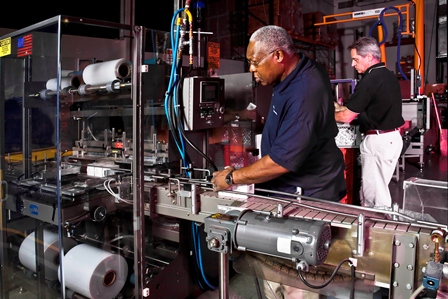Four days before the 2012 Presidential election one enduring mantra from both candidates has been “jobs, jobs, jobs.” With unemployment in the U.S. hovering around 8%, the big question is how to get people back to work. Ro Khanna, a former Deputy Assistant to the U.S. Department of Commerce under the Obama administration, argues that U.S. manufacturing is integral to putting Americans to work and for the general welfare of the nation. His new book, Entrepreneurial Nation: Why Manufacturing is Still Key to America’s Future, delves into the state of manufacturing in the U.S. today, why manufacturing is crucial to the U.S. future, and what policies the country should aim for to strengthen the manufacturing sector. Khanna elucidates his points by using real world manufacturing case examples from his time as a Deputy Assistant.
It’s no secret that manufacturing in the U.S. as a percentage of our GDP has been in a steady decline. Khanna underlines this general sentiment with some hard numbers and facts, including this statement:
“Manufacturing is no longer as significant a share of our economy as it once was, declining from nearly 28 percent of our GDP in the late 1940s after World War II to about 11 percent. We now devote less of our GDP to manufacturing than every other industrial nation except France.”
Clearly manufacturing is not as large part of the American economy as it once was, however, the real question is should it be? It’s worth remembering that the U.S. has undergone structural changes to the economy before. At one time Agriculture dominated our economy, yet now is quite diminished as a percentage of GDP. On that note Khanna introduces two prominent economists, namely Robert Reich and Jagdish Bhagwati, who claim that U.S. should focus on the service sector and downplay manufacturing which has become passé and strictly political feel good fodder. Khanna disagrees and frames his argument for the necessity of manufacturing through the following contentions:
- Manufacturing is necessary to relieve the U.S. large trade deficit. Exporting more and importing less is the key, and therefore, we have to make more products in the U.S.
- Manufacturing creates a demand for good paying jobs that required skilled workers and the U.S. cannot cede these positions to other countries.
- Manufacturing is an essential part of protecting our national security. A strong military with cutting edge technology can only be had with a strong industrial base.
- Manufacturing in the U.S. is inherently of a higher quality and higher value with specialized customer service. The U.S. needs to maintain and protect this global edge.
Khanna makes a compelling argument for the importance of manufacturing. Although that argument underpins the entire book, he quickly shifts to more concrete policy proposals to maintain and grow U.S. manufacturing.
The majority of Entrepreneurial Nation is an exploration of the current landscape of manufacturing in the U.S. with Khanna as a tour guide. The reader is taken to places like Wichita, Kansas, the Air Capital of the World, to see an example of bottom-up clusters of manufacturing. Through this tour of manufacturing the reader is allowed to see how specific companies have succeeded in the global marketplace and their fears for the future of manufacturing. Each chapter also highlights a policy recommendation that Khanna believes would support manufacturing in the U.S. The policy agenda in Entrepreneurial Nation is wide ranging and extensive. Khanna addresses everything from fair trade (with China as main culprit) to tax reform to closing the perceived skills gap of the U.S. worker. So many policy issues are offered that it’s impossible to not quibble with some specific planks, whether it’s the premise or the solution. However, don’t get caught up in the minutiae, Entrepreneurial Nation is a bold and sweeping vision for the future of American manufacturing and it’s place in the U.S. economy. Khanna does an excellent job of laying out the challenges that manufacturers face and the successes that they have achieved. Any person that’s interested in the state of manufacturing and the policies that underlie manufacturing would be wise to start with Entrepreneurial Nation: Why Manufacturing is Still Key to America’s Future.

[…] Valley technology attorney but has found his passion in politics and policy, having written Entrepreneurial Nation and served in the Obama Administration. Ro took time from his very busy campaign schedule to talk […]